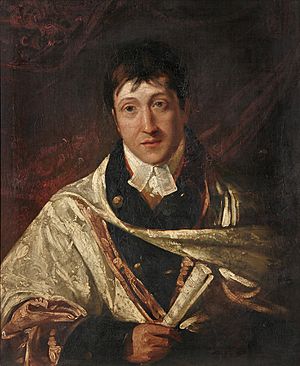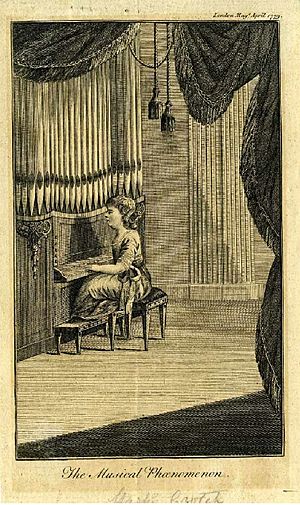William Crotch facts for kids
Quick facts for kids
William Crotch
|
|
|---|---|
 |
|
| Background information | |
| Born | 5 July 1775 |
| Died | 29 December 1847 (aged 72) |
| Occupation(s) | Composer & Organist |
William Crotch (born July 5, 1775 – died December 29, 1847) was a very talented English composer and organist. A composer writes music, and an organist plays the organ, which is a large musical instrument. One expert, Nicholas Temperley, called Crotch "a child prodigy without parallel in the history of music." This means he was an incredibly gifted child, especially in music, and was one of the most famous English musicians of his time.
Contents
William Crotch's Early Life
A Musical Child Prodigy
William Crotch was born in Norwich, Norfolk. His father was a master carpenter. Just like the famous composer Mozart, William was a child prodigy. This means he showed amazing talent at a very young age. He started playing the organ that his father had built when he was just a toddler.
By the age of two, William became quite famous locally. Many visitors came to hear him play. One of these visitors was the musician Charles Burney, who even wrote about William's amazing skills for the Royal Society.
When William was three years old, his mother took him to London. There, he played the organ at the Chapel Royal in St James's Palace. He even performed for King George III himself! William later said that all this attention made him a bit spoiled as a child. People would spoil him so he would keep performing.
William Crotch's Adult Career
Becoming a Professional Musician
William Crotch became an organist at Christ Church, Oxford. He later earned a degree in music there. When he was 14, he wrote his first oratorio, called The Captivity of Judah. An oratorio is a large musical piece for singers and an orchestra, usually telling a story from the Bible. This piece was performed in Cambridge.
His most famous and largest musical work was another oratorio called Palestine, which he wrote in 1812. After this, he mostly wrote smaller pieces of music. It is thought that he might have composed the famous Westminster Chimes in 1793. These are the tunes played by Big Ben every time it strikes the hour.
Teaching and Art
In 1797, Crotch became the Heather Professor of Music at Oxford University. This was a very important teaching position. In 1799, he earned a doctorate in music, which is the highest degree in music.
While at Oxford, he met a musician and artist named John Malchair. William became interested in sketching too. He copied Malchair's style of writing down the exact time and date on all his drawings. When he met the famous artist John Constable in London in 1805, he shared this habit with him.
In 1822, William Crotch was chosen to be the first principal of the Royal Academy of Music. This is a very important music school. He stayed in this role for ten years. Some of his notable students included William Sterndale Bennett and Cipriani Potter.
In 1834, he wrote a new version of his oratorio The Captivity of Judah. This was to celebrate the Duke of Wellington becoming the chancellor of Oxford University. This 1834 version was very different from the one he wrote as a child, even though it used the same words. It was performed twice but was never published.
Later Years and Legacy
William Crotch spent his last years at his son's house in Taunton, Somerset. He passed away in 1847 and was buried in the churchyard of St Peter and St Paul in Bishop's Hull, near Taunton.
Interestingly, two of William Crotch's grandsons, George Robert Crotch and William Duppa Crotch, became famous entomologists. Entomologists are scientists who study insects.
William Crotch's Main Compositions
Here are some of William Crotch's most important musical works:
- Captivity of Judah (1798), an oratorio.
- Three piano sonatas, published in 1793.
- Overture in A (1795), which was the first of his three orchestral "sinfonias."
- Ten Anthems (1798, revised 1804). Anthems are pieces of music usually sung in churches.
- Ode to Fancy (1799), a piece for two choirs, three solo singers, and a small orchestra.
- Three organ concertos (around 1804). A concerto is a piece of music for a solo instrument and an orchestra.
- 12 Fugues, the subjects taken from chants (1835-7) for organ or piano.
- Palestine, an oratorio (1812). This was his most popular work and is often considered his best. It was two and a half hours long!
- Symphony in F major (1814).
- Symphony in Eb (1817), which he did not finish.
- Ode on the King's Accession (1820), for choir and orchestra, written when George IV became king.
- The Joy of our Heart is Ceased (1827), a choral anthem written after the death of the Duke of York.
- Captivity of Judah (1834), a different oratorio with the same name.
- The Lord is King (1838), his last large musical work.
 | Kyle Baker |
 | Joseph Yoakum |
 | Laura Wheeler Waring |
 | Henry Ossawa Tanner |


